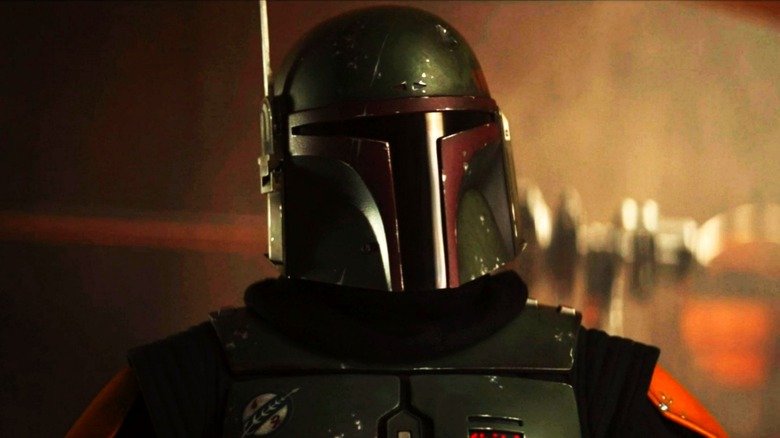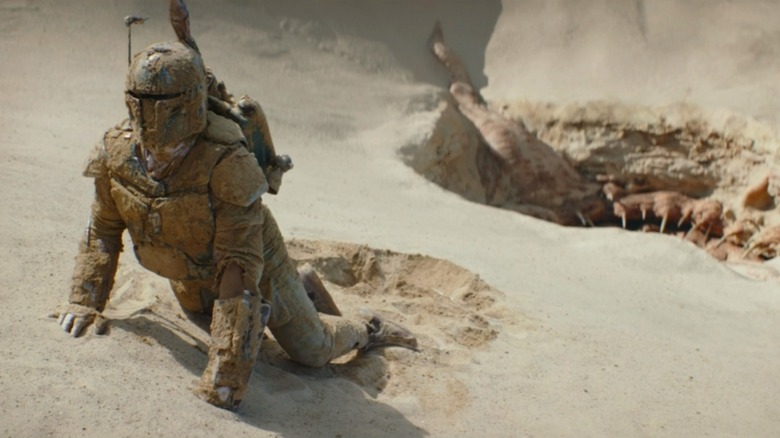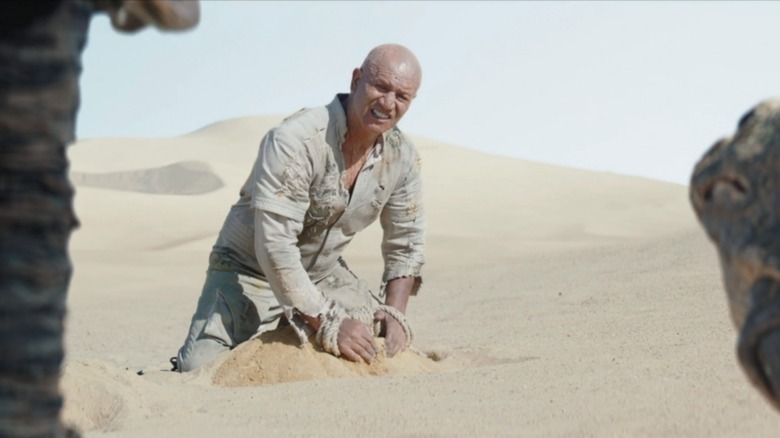Is The Book Of Boba Fett A Redemption Story?
(Yoda voice) If into this article you go, only in-depth spoilers for "The Book of Boba Fett" will you find!
The series premiere for "The Book of Boba Fett" has finally arrived after no shortage of fanfare, over 40 years worth of build-up, and plenty of pent-up demand to resolve an inexplicable resurrection from (seemingly) certain death hanging over Boba Fett's head. No single episode of any show could possibly hope to live up to such lofty expectations, and "Chapter One: Stranger in a Strange Land" seems to recognize this. Directed by Robert Rodriguez, the premiere takes a surprisingly low-key approach to setting the table and establishing a foundation on which to build the rest of the season.
That's not to say the future of the series lacks potential, however, as the premiere certainly lays the groundwork for the central conflict at the heart of Boba Fett's character. "Jabba ruled with fear. I intend to rule with respect," Boba declares to Fennec Shand, literally seconds before they're both ambushed by a mysterious group of enemies — ones who clearly don't have much respect for Tatooine's newest crime lord just yet. This sequence of events might as well be a warning flare, indicating the main struggle Boba Fett will have to deal with throughout the show.
Earlier in the episode, the differences between Boba Fett and Jabba the Hutt's respective, ah, leadership approaches are put in even sharper relief. First, an ambassador of the local Mayor boldly strides into Boba's throne room — not to pay tribute, but to demand it. Fennec, in sheer disbelief at this display, rightfully observes that Jabba never would've let this affront stand. Boba, however, quietly endures the insult and allows the Mayor's majordomo to leave unscathed. Immediately afterwards, the appearance of the two Gamorrean bodyguards seen in "Return of the Jedi" (formerly in Jabba's employ and lately in Bib Fortuna's) could've easily just served as an exercise in indulgent nostalgia, but instead adds even more evidence in favor of Boba's dramatic change of heart. Rather than torture the pair, as the palace droid suggests, Boba accepts them into his own retinue over Fennec's protestations. Meet the new boss, who's decidedly not the same as the old one.
With one episode, "The Book of Boba Fett" plants its flag in some thematically compelling territory: can Boba Fett be redeemed? More importantly, should he?
Think of the Character Development!
In Bryan Young's review of the premiere for /Film, he lays out the pressing issue with Boba Fett's abrupt about-face — which, to be clear, can easily be remedied in future episodes. Thus far, his journey from a merciless bounty hunter to this older and more wizened survivor who hasn't completely let go of his criminal ways has taken place entirely off-screen. As Young puts it:
"Boba Fett is changed, but we're not exactly sure how or why. He's less ruthless and more 'honorable' than we've seen him in past iterations and the flashbacks of his previous timeline hope to give us some of the context that will allow us to understand how he changed. With somewhere between three and five years between the flashbacks and the present timeline, there is a lot of ground for the show to cover to show us these changes."
In the "glass half full" perspective, it's easy to see how following through on this idea could transform "The Book of Boba Fett" from a novelty concept into a show worth watching, as opposed to a transparently obvious attempt to mine the "Star Wars" IP for all it's worth. Let's be honest: Despite his disproportionate popularity over the years, Boba Fett was always kind of a chump. He shows up for a few minutes in "The Empire Strikes Back," makes a brief impression with his eye-catching armor, and promptly gets knocked into the Sarlacc pit in "Return of the Jedi" like a total loser. It's all very anticlimactic, which is a big reason why the now-defunct Expanded Universe (referred to now as "Legends") constantly brought Boba back from the dead to give him some interesting stories for a change.
Here, then, is the opportunity to finally imbue the character with a well-rounded and functional arc for the first time in his (canonical) existence. As fun as his role in "The Mandalorian" was, his presence mostly just set up this spin-off show. Freed from the shackles of starring in someone else's story entirely, however, Boba Fett may yet justify the voracious appetite among fans for this action figure of a villain ... and those flashbacks, running in tandem with the present-day storyline, may prove key in doing so.
But What If This Sands Off His Rough Edges?
Okay, look, maybe Anakin had a point about sand: Not only does it get everywhere, but sand also has the ability to smooth out any rough spots until no amount of personality or individuality is left. I wouldn't be surprised if Boba Fett shares this same viewpoint with the fallen Skywalker, having spent as much time as he has in the deserts of Tatooine. But his experiences as Darth Vader's lackey and in the presence of Jabba the Hutt provided the former bounty hunter with an instinct for survival and one hell of a mean streak.
Make no mistake: Boba Fett is a villain, through and through. Let's put it this way: There's a very good reason why the writers of "The Mandalorian" spared Boba from running into Luke Skywalker at the conclusion of the second season. Not only would that already-distracting cameo have become even more so, but there remains that pesky little detail of how Boba sent Luke's pal, Han Solo, off to his doom with Jabba. (If Boba had remained with Din Djarin and Baby Yoda instead of flying away into his new spin-off series, can you even imagine the conversation Luke would've had with Han? "Hey, Han ol' buddy, so you'll never guess who I just ran into...")
You know what, though? People gravitated towards Boba Fett, one-dimensional as he was in the original trilogy, precisely because he's a villain.
Thanks to the prequels, George Lucas even gave us a wholly unnecessary origin story, describing in minute detail how Boba Fett's villainy is deeply rooted in his clone "father" Jango's distaste for the Jedi. Now, however, "The Book of Boba Fett" runs the risk of watering down all that established history, leaving us with an antihero who may very well turn into an outright hero when all is said and done. Nobody would dispute the franchise's storied tradition of rehabilitating villains, of course, but something doesn't feel right about taking that approach with someone of as ill repute as Boba Fett. That's not to say that characters shouldn't grow or change over time, but hopefully the driving force behind this moral awakening isn't merely a result of audiences needing a sympathetic figure to follow in this series. As has been proven countless times, antiheroes and other questionable characters can be just as compelling to watch.


